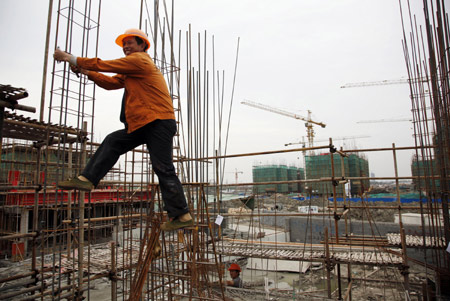Economy
Rates hiked to cool housing market
By Hu Yuanyuan and Wang Ying (China Daily)
Updated: 2010-10-21 09:38
 |
Large Medium Small |
A worker labors on a construction site for a residential development in Shanghai.[Photo/Agencies]

But latest increase not expected to dent high-end demand
BEIJING - The latest interest rate hike will help to further curb speculative home purchases and ease the price growth potential in the fourth quarter, industry analysts said.
The People's Bank of China on Tuesday raised interest rates for the first time in nearly three years, in an attempt to combat inflation and soak up excessive market liquidity.
"The increase in the interest rate will increase speculators' investment costs, dwarfing their demand," said Yang Hongxu, an analyst with the Shanghai-based E-House China Research and Development Institute.
After the increase, the benchmark interest rate for five-year loans will grow to 6.14 percent from 5.94 percent. In the case of a 1 million yuan ($150,344.29) mortgage over 30 years, the monthly payment will rise by 104 yuan for first-home buyers. For second-home buyers, the monthly increase will hit 145 yuan.
"The interest rate hike will also change buyers' expectations and hurt market sentiment, further cooling down the property market," Yang said.
The property market in key cities chilled after the central government on Sept 29 launched measures to further raise down payments and expand property tax trials nationwide.
According to the Beijing Real Estate Transaction website, only 1,064 units of new apartments were sold out during the recent National Day holiday, down 74 percent from the previous week.
Property sales in Shanghai also fell 15.6 percent between Oct 11 and Oct 17 from the previous week, according to statistics from property agent E-House China (Shanghai). That was the first time Shanghai had experienced a decline in property trading in 11 weeks.
"Due to the new policies, homebuyers are likely to adopt a wait-and-see attitude again, delaying purchases until they can assess the impact that the policies have on prices," said Michael Klibaner, head of research for Jones Lang LaSalle China. "Transaction volumes are expected to fall significantly and housing prices will go down slowly in the next few months, with a maximum change of within 5 percent over the year."
"As most high-end buyers can afford more than 50 percent as the down payment, the 10 percent increase and interest rate hike means nothing to them," Wang said.
Han Fei, the marketing manager of the Royal Garden in Beijing's Central Business District, said the project, developed by Shimao Group, sold at an average price of 65,000 yuan per square meter.
"Most of our buyers made one-off payments and they don't care much about the increase in down payment and the interest rate hike," Han said.
Riverside IV, a new project along Beijing's southeast Fourth Ring Road, plans to increase its sale price to 43,000 yuan per square meter, despite the continued tightening measures.
"It is different from 2008. We still have a rich cash flow. Meanwhile, the supply of high-end properties will be limited in the future," said a company executive.
But the latest interest rate hike does pose a challenge for some property developers.
"When most financial institutions have tightened their credit to real estate firms, the interest rate hike will further increase their loan costs and prompt them to cut prices to stimulate sales," said Lin Lei, marketing chief of the US-listed real estate brokerage firm Century 21st. "Smaller property developers or those faced with tightened cash flow will be the first group to suffer."



